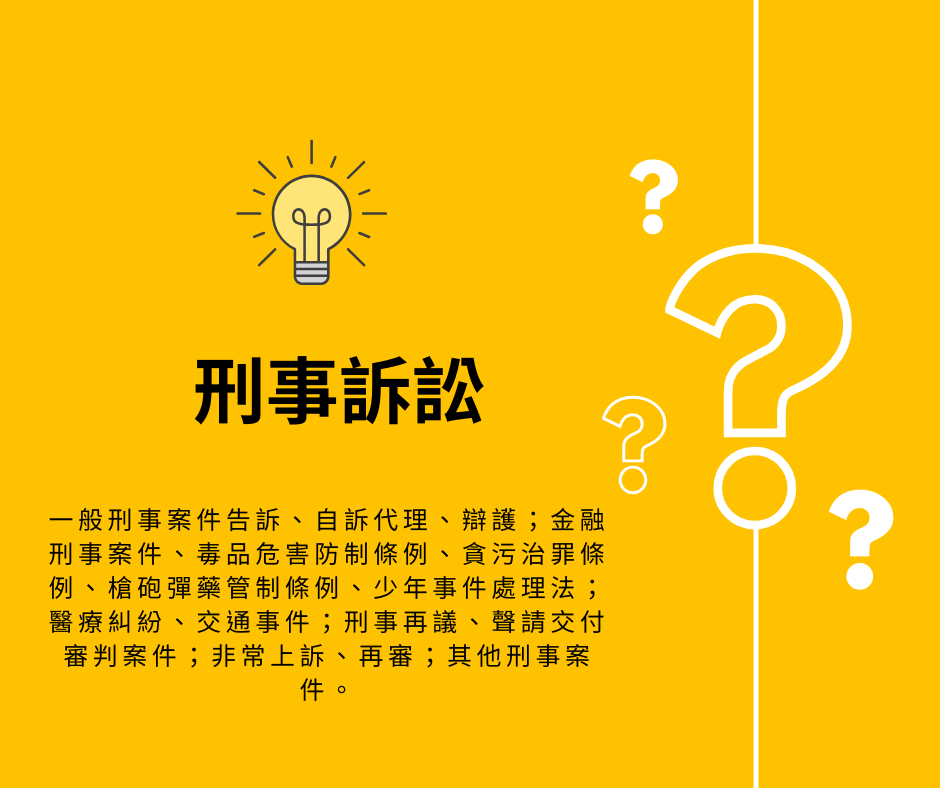文章分類Article
Aggravated Fraud | Creating a new Supreme Court perspective!

In recent years, our firm has diligently undertaken an aggravated fraud case. During the district court proceedings, the district court noted that our client had expressed "no opinion" in both police interrogation records and prosecutor interrogation records. The High Court then considered the client's "express consent" as evidence, rejecting the arguments made by our lawyers, Vincient Huang and Herman Lyu, that police interrogation and investigative records were hearsay evidence and could not be used as the basis for evidence.
The case was appealed to the Supreme Court, and fortunately, the Supreme Court adopted the legal opinion that police interrogation and investigative records argued by Vincient Huang and Herman Lyu were hearsay evidence. Our firm actively explained that "not arguing" and "having no opinion" should no longer be deemed as consent with evidential capability. The Supreme Court issued the "109th Year Tai Shang No. 1503 Criminal Judgment," agreeing with our firm's argument, overturning the original decision, and remanding the case to the Taiwan High Court.
【What is implied consent?】
Article 159-5 of the Criminal Procedure Code stipulates that statements made outside of trial by persons other than the defendant, even if they do not comply with the provisions of the preceding four articles, may be considered as evidence if agreed upon by the parties during trial procedures. The court may deem such verbal or written statements appropriate as evidence after considering the circumstances under which they were made. If the party, representative, or defense attorney, during the court's evidence examination, is aware of circumstances under Article 159, Paragraph 1, that would disallow the evidence but does not object before the conclusion of oral arguments, it is deemed as consent under the previous paragraph.
In simpler terms, statements made outside of trial by persons other than the defendant are considered hearsay evidence. According to Article 159 of the Criminal Procedure Code, hearsay evidence cannot be used as evidence. However, there are exceptions within the Criminal Procedure Code, such as Article 159-5, which allow hearsay evidence if the parties have consented to its use, under the assumption that it would not disadvantage the defendant. This exception grants evidentiary status to hearsay, known as "consent to hearsay."
Furthermore, consent to hearsay is divided into "express consent" and "implied consent." The key difference between the two is that once express consent is given, it maintains the stability and accuracy of the legal proceedings and cannot be withdrawn later; whereas implied consent can still be objected to and withdrawn before the conclusion of oral arguments.
【What is the Supreme Court's established opinion?】
The Supreme Court has previously held that if a defendant, in response to the presentation of hearsay evidence, expresses "no opinion," "no comments," or "does not dispute," it will be considered as "express consent." If deemed to have expressly consented, the defendant cannot subsequently object.
For instance, in the Supreme Court's decision No. 4538 of 2018, it was stated that the exception to the hearsay rule under Article 159-5 of the Criminal Procedure Code is based on the party's express consent to use hearsay evidence as set forth in Paragraph 1 of the same article, provided that the expression of intent is without flaw, or based on Paragraph 2, the party, representative, or defense attorney, aware of the circumstances under Paragraph 1 of Article 159 that would disallow the evidence, does not object before the conclusion of oral arguments. This is based on the parties' right to consent to procedural actions (including the express consent under Paragraph 1 of Article 159-5 and the implied consent under Paragraph 2), and the court's involvement in reviewing its appropriateness, thereby granting evidentiary status to otherwise inadmissible hearsay evidence. During the preparatory proceedings and the evidence examination at trial, when the court presented and summarized the statements made by witness You Sheng-Xing during the first-instance trial and the statements made by witness Lu Xiu-Hui during the investigation and the first-instance trial, the appellant and their defense attorney expressed no dispute or comments regarding the evidentiary status of these statements (see pages 89 to 90, and 272 to 274 of the original trial records). Since the statements made by witnesses You Sheng-Xing and Lu Xiu-Hui after binding conclusions during the first-instance trial were not hearsay, they possessed evidentiary status. The original trial, after considering the circumstances under which Lu Xiu-Hui's evidence was produced and finding no illegal or improper conditions, deemed that Lu Xiu-Hui's interrogation record also had evidentiary value, thus not violating the rules of evidence.
【What is the Supreme Court's opinion on this case?】
In the Supreme Court's decision number 1503 of the 109th year, it was stated, "The so-called 'express consent' refers to a clear expression of agreement regarding the evidentiary status of specific evidence. If one merely expresses 'no opinion,' 'does not dispute,' or 'has no comments' in response to the presentation of such evidence, this differs from express consent and does not have the effect of express consent." Our client, regarding the statements made by other co-defendants during police interrogations and investigations, claimed "no opinion" during the evidence examination process, making it difficult to recognize that there was express consent to the hearsay evidence. The original judgment, which was based on this as a foundation for the decision, thereby violated the rules of evidence!
It is noteworthy that the above change in practical opinion regarding hearsay consent not only alters the Supreme Court's past opinions but also ensures more protection for defendants in the evidentiary presentation process during trials. This allows defendants to dispute evidence that may be favorable or unfavorable to them, once again highlighting the value of lawyers in the criminal trial process.
Reference:Chapter 32 of the Criminal Code: Crimes of Fraud, Breach of Trust, and Usury